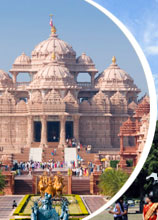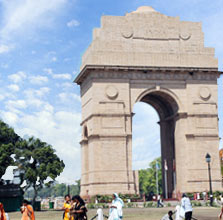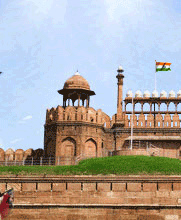 Safdarjung's
Tomb entombs Muqim Abul Mansur Khan, also known as Safdarjung. He was
the viceroy of Awadh under the Mughal Emperor, Mohammed Shah and later
became his prime minister. Nawab Shuja-ud-Daulah, Safdarjung's son,
constructed Delhi Safdarjung's Tomb, the last garden tomb in the city,
in the year 1753-54. The tomb consists of a number of charming pavilions
namely Jangli Mahal, (Palace in the woods), Moti Mahal (Pearl Palace)
and Badshah Pasand (King's favorite).
Safdarjung's
Tomb entombs Muqim Abul Mansur Khan, also known as Safdarjung. He was
the viceroy of Awadh under the Mughal Emperor, Mohammed Shah and later
became his prime minister. Nawab Shuja-ud-Daulah, Safdarjung's son,
constructed Delhi Safdarjung's Tomb, the last garden tomb in the city,
in the year 1753-54. The tomb consists of a number of charming pavilions
namely Jangli Mahal, (Palace in the woods), Moti Mahal (Pearl Palace)
and Badshah Pasand (King's favorite). There is also a madrassa (Muslim School) inside the premises of the Tomb Of Safdarjang, Delhi. The red sandstone and buff stone monument comprises of the tomb, the courtyard and a mosque. There is a library over the main gateway, maintained by the Archaeological Survey of India (ASI). One of the last remnants of Mughal architecture, Safdarjung's Tomb is to some an extent like the Humayun's Tomb. It stretches over an area of 300-sq-metre and is set in the middle of a widespread garden.
The Mughal 'Chaharbagh' style garden has an enclosure raising to two levels, which is entered through an enormous entrance. The central chamber of the tomb stands surrounded by eight rooms all around. The corner apartments of the Delhi Safdarjung Tomb are octagonal, while the rest are rectangular in shape. There is also a dome of the tomb that rises from a sixteen-sided base. The two graves inside the Tomb of Safdarjang, Delhi belong to Safdarjung and most probably his wife.










